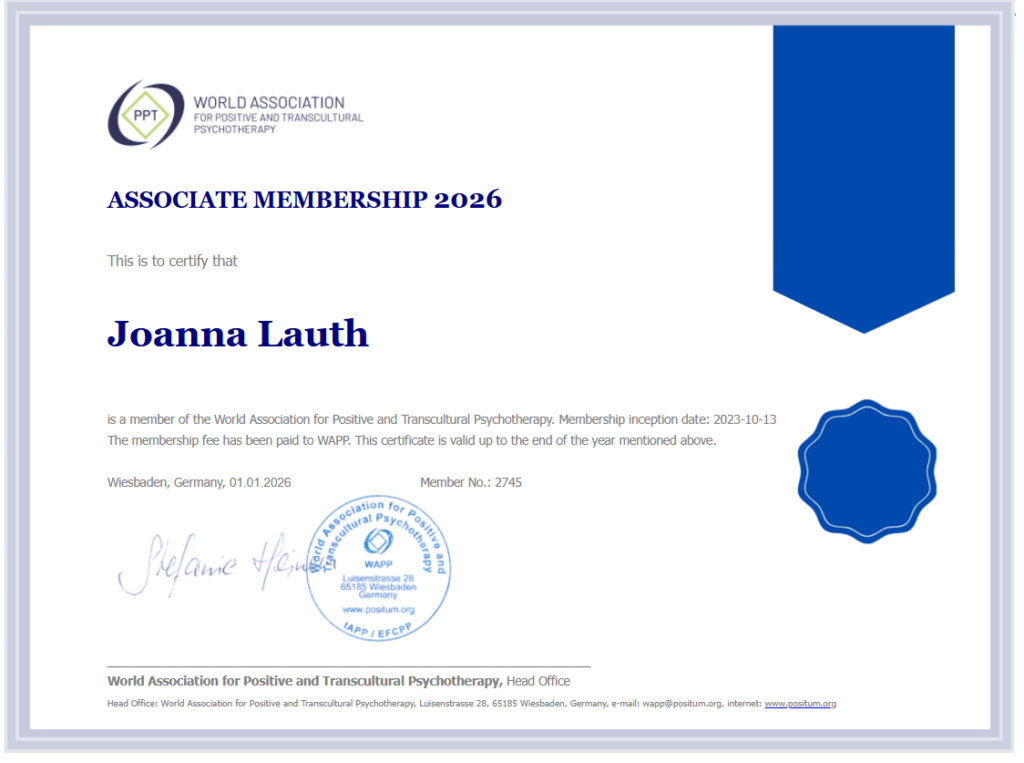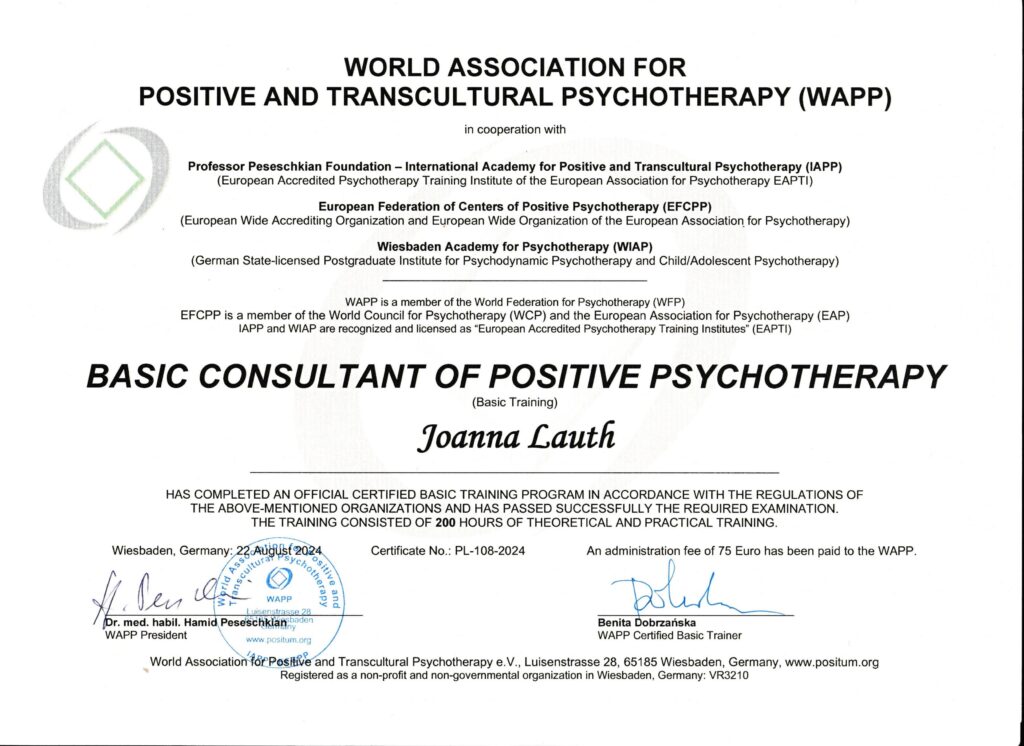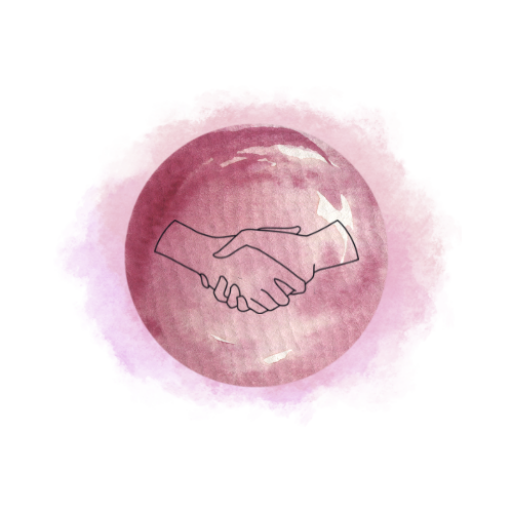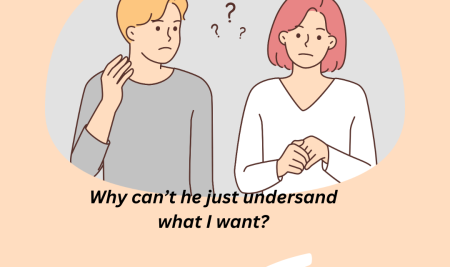Positive and Transcultural Psychotherapy

Welcome
Starting therapy is a big step — and often not an easy one, especially when appointments in the public system are hard to find. Sometimes it can take months until a place becomes available. While you are on a waiting list, even a few sessions in private practice can already give you support, orientation, and practical tools to help you through this time.
In my practice, the focus is on you as a whole person — not only your challenges and symptoms, but also your strengths and resources. Instead of asking “What is wrong with me?” the focus is on “How can I help myself?”
I work with a psychodynamic and humanistic approach — Positive and Transcultural Psychotherapy — and adapt the process to your needs: sometimes more as counselling for current questions, sometimes as deeper therapeutic work. The goal is always to support you in building skills that last long after our sessions end.
How can you find out if my therapy approach is right for you?
If you’re unsure whether my way of working is right for you, feel free to get in touch – I’ll be happy to answer your questions about the process, content, or framework of therapy.
If you’d like to get a first impression and ask questions, I also offer a short online session (15 minutes) free of charge.
How I work
In my sessions, I meet you with warmth and genuine attention. I offer respect without judgment, so you can feel safe to bring whatever is on your mind. Therapy is a collaborative journey – we walk the path together and shape it in a way that fits your needs.
Your contact with me
📞 Phone & WhatsApp: 0160-91130624
📧 Email: info@ppt-therapie.de
💻 Online booking: directly via [Doctolib] (blue icon on the right)
👉 Write me, call me, or book your appointment online – whichever way is easiest for you.
Joanna Lauth
Positive and Transcultural Psychotherapy
Trustindex überprüft, ob die Originalquelle der Bewertung Google ist. Joanna ist eine sehr einfühlsame und professionelle Therapeutin. Sie hört aufmerksam zu, geht individuell auf meine Themen ein. Sie ist verständnisvoll, kompetent und schafft eine vertrauensvolle Atmosphäre. Sie macht ihre Arbeit Super und ich fühle mich sehr wohl bei ihr. Besonders schätze ich, dass sie auch in finanzieller Hinsicht Rücksicht genommen und mir entgegengekommen ist, denn das ist nicht selbstverständlich. Das zeigt, wie sehr ihr das Wohl der Klienten am Herzen liegt und dafür bin ich ihr sehr dankbar. Ich kann sie von Herzen weiterempfehlen!Trustindex überprüft, ob die Originalquelle der Bewertung Google ist. Joanna Lauth is a deeply compassionate and skilled psychotherapist, one of the most empathetic people I've ever met. Her extraordinary commitment to her work and impressive scientific knowledge make her sessions so incredibly valuable and supportive. She tailors her approach to each person, and you can feel how much she cares. I highly recommend herTrustindex überprüft, ob die Originalquelle der Bewertung Google ist.
Blog
Parenting Abroad: The Backpacks We All Carry
About Me
I am a licensed Heilpraktikerin für Psychotherapie in Berlin and a certified consultant in Positive and Transcultural Psychotherapy (WAPP) and a member of the World Association for Positive and Transcultural Psychotherapy (WAPP) – www.positum.org. My approach combines scientifically grounded methods with warmth, clarity, and a resource-oriented attitude.
I support adults who feel stressed, overwhelmed, or caught in recurring conflicts. Many of my clients are navigating life transitions, cultural changes, or relationship challenges and are looking for a safe and confidential space to explore new perspectives.
What you can expect
- Short waiting times and flexible appointments – sessions can take place weekly, every two or three weeks, or according to what fits your situation best.
- Individual and couple therapy and counseling sessions in Berlin-Friedrichshain or online.
- Multilingual counselling: German, English, Polish.
- A strengths-based approach that helps you reconnect with resilience and inner resources.
- Ideas and reflections for the time between sessions — so the process continues to unfold in your everyday life.
My goal is to offer professional, empathetic support that makes you feel understood and empowered.
Personal
Outside of my practice, I love nature, my family, and the small moments in life that ground us. This balance also shapes my therapeutic attitude: professional, empathetic, and approachable.
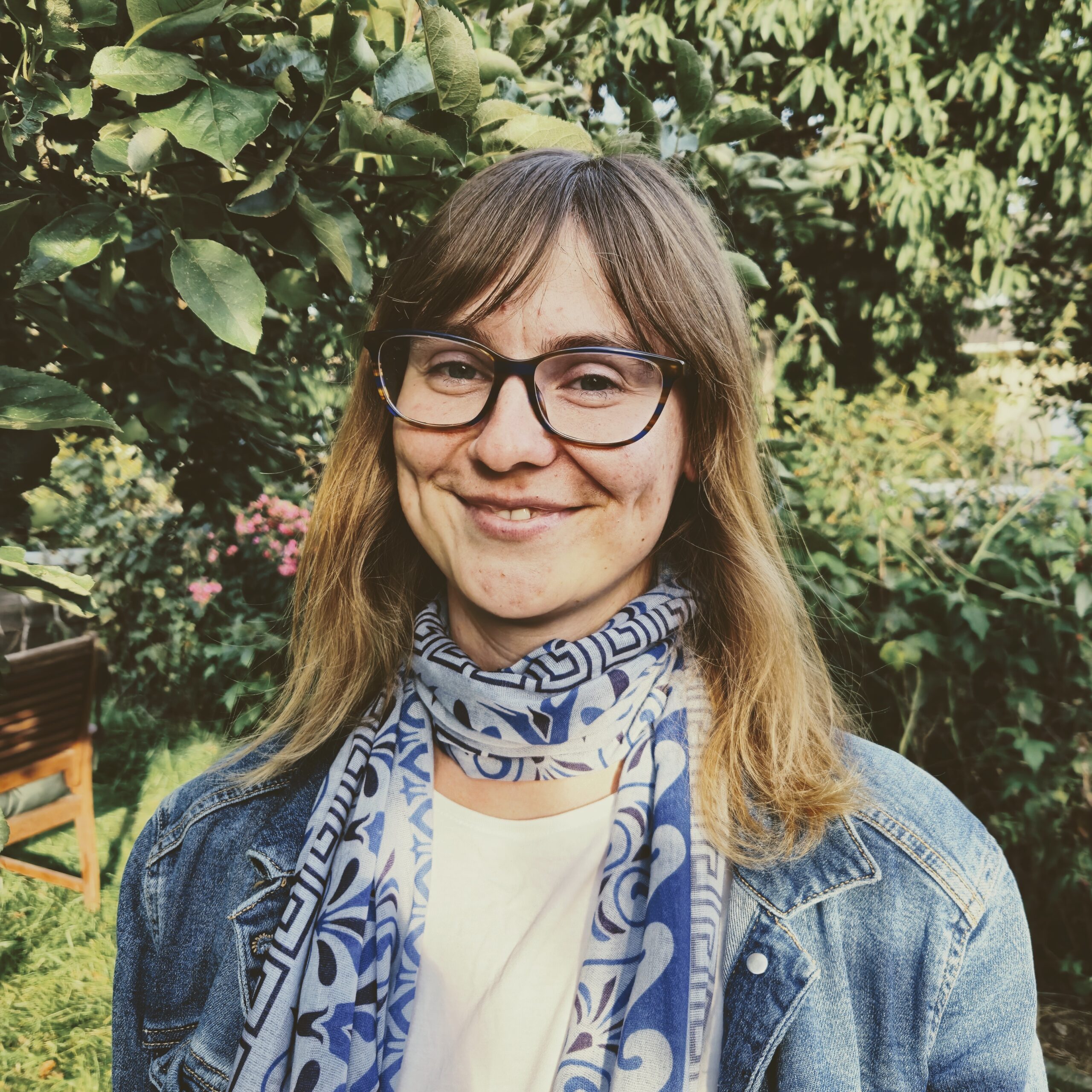
My background
Alongside my work in private practice, I work as a psychological counselor at the European University Viadrina in Frankfurt (Oder), supporting people in a wide range of life situations and challenges within an international and culturally diverse environment.
With a strong foundation in communication, language development, and multilingualism, I bring therapeutic experience from both multicultural settings and clinical practice. Speaking German, English, and Polish, I offer flexible and respectful support for adults facing stress, conflicts, or life transitions – helping you gain clarity and discover new ways forward.
I have experience in therapeutic work with multilingual children who face language development difficulties and I also gained experience working with patients during my clinical internship on the general psychiatry ward at a psychiatric clinic in Angermünde, Germany.
What is Positive and Transcultural Psychotherapy?
Positive Psychotherapy is a modern, evidence-based approach rooted in psychodynamic and humanistic traditions. The word “positive” comes from the Latin positum – meaning “that which is given, that which truly exists.” This reflects the idea that people are defined not only by their difficulties, but also by their strengths, skills, and inner resources.
You don’t have to “always be positive.” In therapy, painful emotions such as anger, sadness, or exhaustion are welcome and taken seriously. The process involves acknowledging what hurts without rushing to fix it – while also exploring what supports you, what matters to you, and how growth can emerge even from crisis.
Positive Psychotherapy is transcultural, always considering cultural and intercultural contexts. Its effectiveness has been confirmed in numerous clinical studies (positum.org).

“It is not because it is difficult that we do not dare, but because we do not dare, it is difficult.” Seneca
The compass of my therapeutic approach:
The Three Main Principles of Positive Psychotherapy

1. Hope
Developing new perspectives

2. Balance
Restoring inner equilibrium
Where do I feel overwhelmed? What have I neglected? What is ready to grow?
Every person has different strategies for dealing with challenges. In Positive Psychotherapy we focus on four key areas of life:
Body & Health
Achievement & Work
Relationships & Contact
Future & Meaning
When these areas are brought back into balance, clarity and inner strength can emerge.

3. Consultation
Help towards self-help
Positive Psychotherapy always aims to strengthen self-efficacy. In five steps – from observation to the expansion of goals – you learn how to make better use of your own resources. Psychoeducation plays a central role here: you receive knowledge and tools that continue to support you beyond the sessions.
Psychotherapy & Counselling – Issues that may bring you here
Many of my clients come with similar questions or challenges. Common concerns include:
Conflicts & Relationships
Difficulties in partnership, family, or work – often also in a transcultural context.
Stress & Overload
When everyday or professional demands feel overwhelming and it becomes hard to switch off.
Anxiety & Insecurity
Panic attacks, intrusive thoughts, or adjustment difficulties that limit your daily life.
Parenting & Family Life
The wish for more support and clarity in your role as a parent, e.g. in matters of upbringing.
Meaning & Orientation
Searching for what truly matters to you – and the desire to give your life a new direction.

If some of this feels familiar:
Feel free to reach out or book an appointment – we’ll find the right way forward together.
Psychotherapy and Counseling - important information:
Sessions in my practice are privately paid, as statutory health insurance does not cover therapy with a Heilpraktikerin für Psychotherapie. Some private or supplementary insurances may reimburse part of the cost.
Self-paid therapy also brings certain advantages: flexibility in scheduling (weekly, every two or three weeks), freedom to shape the process around your needs, and the possibility to combine counselling with deeper therapeutic work. Sometimes just a few sessions are enough, sometimes more time is helpful.
I see therapy as an investment in your well-being and personal growth — one that can help you develop skills and inner resources you carry with you long after our sessions.
Fees and Payment
Individual Sessions
Initial consultation (50 minutes): €75
Further individual sessions (50 minutes): €90
Couple Counseling & Couple Therapy
I offer couple counselling and couple therapy for couples in different life situations. The focus is on communication, mutual understanding, and a constructive way of dealing with conflict and change.
I have particular experience working with couples in transcultural and multilingual contexts, for example when different cultural backgrounds, values, or family expectations play a role. These differences can be enriching, but they can also present specific challenges within a relationship.
Fees:
• Initial session (60 minutes): €90
• Further sessions (60 minutes): €100 (per couple)
The sessions provide a safe and supportive space for clarity, orientation, and development — respectful, structured, and tailored to your individual needs.
Payment options: card or bank transfer (for online sessions).
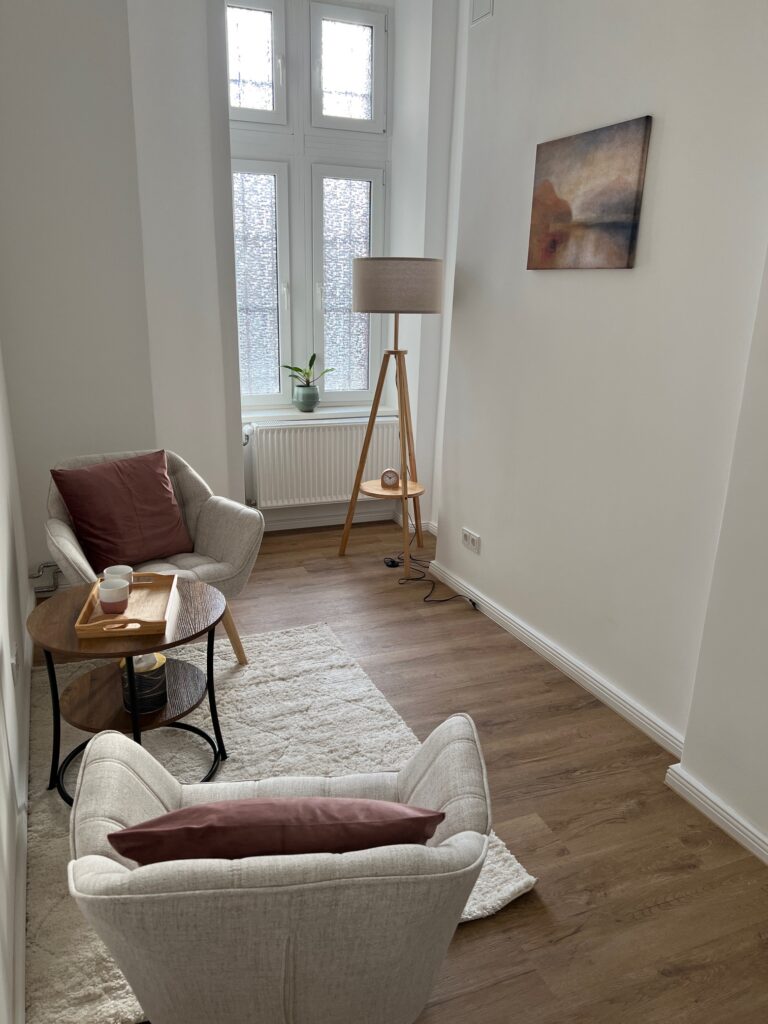

Note:
In urgent emergencies, such as severe crises or acute suicidal thoughts, please contact emergency services immediately by calling 112.
Or look for help here: https://www.telefonseelsorge.de/. Or if you're based in Berlin: https://www.berliner-krisendienst.de/ .
